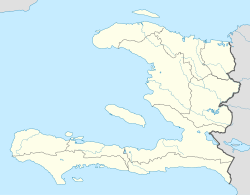This article needs additional citations for verification. (January 2017) |
Saint-Marc
Sen Mak | |
|---|---|
 Saint-Marc Welcome Sign at Frecyneau | |
| Coordinates: 19°7′0″N 72°42′0″W / 19.11667°N 72.70000°W | |
| Country | |
| Department | Artibonite |
| Arrondissement | Saint-Marc |
| Settled | 1716 |
| Population (2003 Census) | |
| • Total | 160,181 |
| Climate | BSh |
Saint-Marc (Haitian Creole: Sen Mak) is a commune in western Haiti in Artibonite departement. Its geographic coordinates are 19°7′N 72°42′W / 19.117°N 72.700°W. At the 2003 Census the commune had 160,181 inhabitants. It is one of the biggest cities, second to Gonaïves, between Port-au-Prince and Cap-Haïtien.
Before the settlement of the French, the region was known as Amani-y ad part of the Xaragua caciquat.
The port of Saint-Marc is currently the preferred port of entry for consumer goods coming into Haiti. Reasons for this may include its location away from volatile and congested Port-au-Prince as well as its central location relative to a large group of Haitian cities including Cap-Haïtien, Carrefour, Delmas, Fort-Liberté, Gonaïves, Hinche, Limbe, Pétion-Ville, Port-de-Paix, and Verrettes. These cities, together with their surrounding areas, contain nearly eight million of Haiti's ten million people (2009).
In 1905 the Compagnie Nationale or National Railroad built a 100 km railroad north to Saint-Marc from the national capital of Port-au-Prince. The track was later extended another 30 km east to Verrettes.
